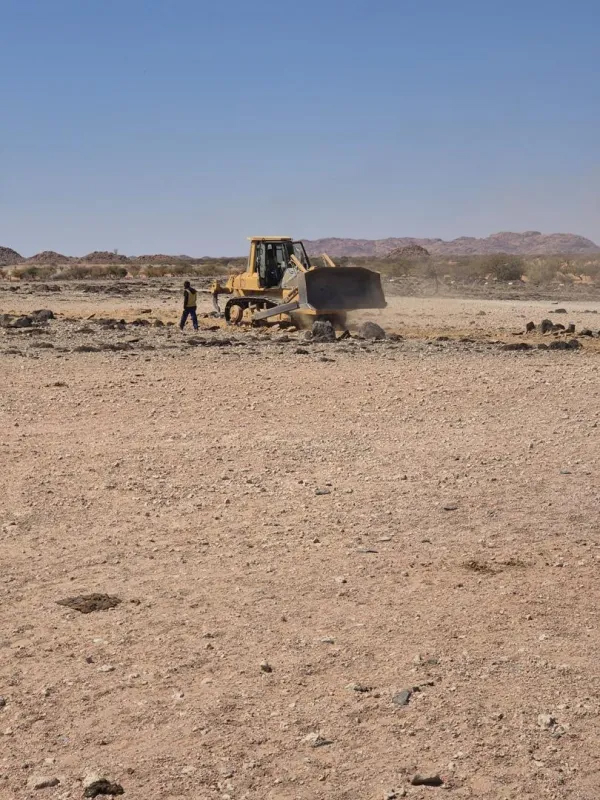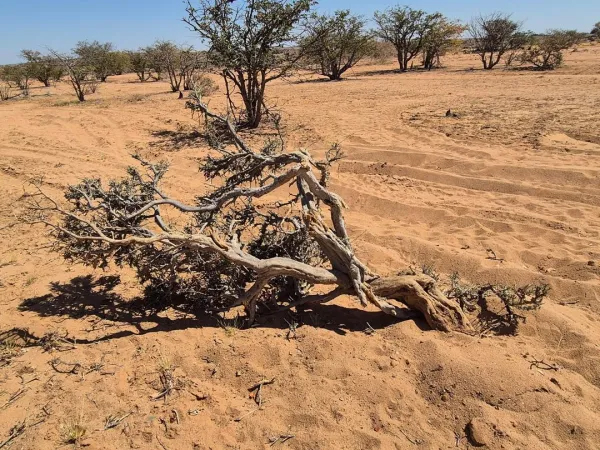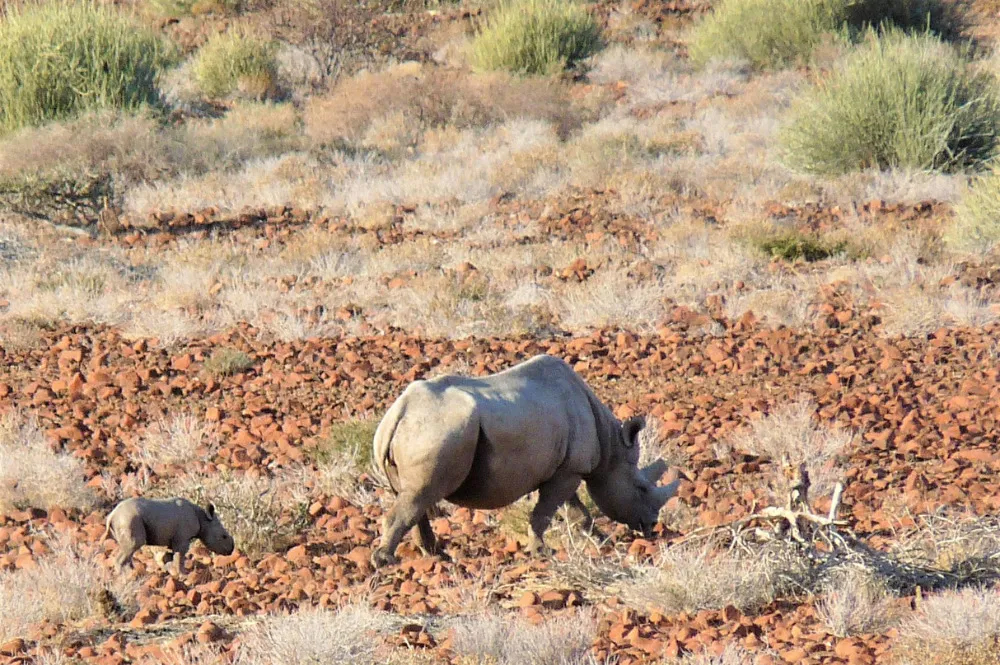By Don Pinnock | December 3, 2024
The blurb for an editorial in The Namibian newspaper on 9 November read: “From Kavango to Kunene, down south across the breadth and width of Namibia, the scramble for the country’s mineral, oil and energy sources is in overdrive.”
The article ended: “Government officials have turned Namibia into an unsustainable El Dorado with a vicious cycle of short-term searches for riches dishing out mining exploration licences to a select few.”
As you read this, graders, excavators and tipper trucks are hacking a road through three conservancies famous for their conservation of endangered, desert-adapted black rhino. It will provide access to an area licensed for the development of an opencast mine for low-value tin.
The conservancies concerned are Uibasen Twyfelfontein, Doro !Nawas and Sorris Sorris. Between 2018 and 2023, they signed agreements with Ultimate Safaris to develop tourist infrastructure, including several luxury camps focusing primarily on black rhino tracking activities.
This is estimated to earn the conservancies more than $16.6-million in cash during the 20-year tenure of the agreements, but does not include the value of employment, conservation and community development efforts and contributions to the local value chains from an economic perspective.

Interdict
A high court interdict to stop the road building and mining brought by the conservancies and Ultimate Safaris includes appendices claiming that mining operations will devastate wildlife, specifically the extremely sensitive black rhino, or cause it to migrate and cripple the tourism revenue on which the conservancies depend. At present, the area is one of the safest habitats for black rhino in the world and a model for the country’s conservancy system.
A document supporting the interdicts (there are several) says there are no less than 18 claims with a tenure of three years filed by Otillie Ndimulunde, who “seems to be a proxy for [historian at the Ministry of Defence and Veterans Affairs] Timoteus Mashuna to enable access to more mining claims, as a Namibian may only have ownership of 10 mining claims”.
Mashuna has denied any links to Ndimulunde. However, the conservancies base the “proxy” claim on the fact that the environmental clearance certificates, the environmental management plans and the mining claim applications for both Mashuna and Ndimulunde are identical, using the same practitioner. On the document, the telephone number of the proponent is Mashuna’s. Also, both parties are represented by the same lawyers.
Mashuna was one of three government officials who, The Namibian claimed in October 2022, were linked to a controversial $2.77-million lithium mining deal.
“The officials are suspected of using their relatives and associates to apply for mining claims in areas with high-value minerals, especially where there is interest from foreign mining companies,” said a report by the newspaper’s investigative unit at the time.
In response to the conservancies’ report, Timoteus Mufeti, environmental commissioner in the Ministry of Environment, Forestry and Tourism, said it was inappropriate to give the ministry’s position because of a high court application about the issue. He added that the conservancies’ call to suspend or cancel the mine’s environmental clearance certificates was inappropriate and unlawful because they were permitted only to inform on irregularities.

Mufeti said he had observed some noncompliance with the conditions of the clearance certificates, but this did not warrant their suspension and/or withdrawal. Instead, he had issued the mine owner with a compliance order.
According to reports from the conservancies, there also seems to be a link to Paulus Nghifikepunye of Sinco Holdings. Through other business interests, he seems to benefit from contract work done for the environment ministry.
“Sinco Fishing, we assume a subsidiary of Sinco Holdings, has links to the Fishrot scandal,” the conservancies state.
In 2023, whistle-blower Johannes Stefansson claimed that the Icelandic fishing company Samherji paid millions of dollars, through tax heavens such as Cyprus and the Marshall Islands, to bribe high-level officials in Namibia in exchange for trawling rights. With an annual turnover of $700-million, Samherji is one of the largest fishing companies in the world.
In August this year, the Sorris Sorris, Doro !Nawas and Uibasen Twyfelfontein conservancies, along with Ultimate Safaris, approached the high court for an urgent order interdicting and restraining Mashuna from “in any manner whatsoever using heavy machinery, including graders, excavators and tipper trucks to construct a new road” through the conservancies. The application included relief against the minister of mines and energy and his counterpart at the environment ministry, as well as the mining and environmental commissioners, in relation to mining claims.
This was granted by the high court pending an application to be brought to review and set aside the decision of the minister of mines and energy to register the mining claims in Mashuna’s name.
At the time, it was not apparent that further claims in the name of Ndimulunde had also received clearance, which necessitated an interdict application against her as well.
In its judgment, the court put an interim interdict in place as well as a judicial writ on Mufeti to act on previous requests to suspend or cancel the issued environmental clearance certificates. However, he refused to do so and merely issued a compliance order. Mufeti claimed the area was no longer regarded as an environmentally sensitive area by the environment ministry and that the claims could be issued.
The compliance order, in fact, rubber-stamped the very detail the mining proponents still required to execute their activities, such as building a road and removing protected flora to do so.
Back in court
The applicants have now returned to court to contest Mufeti’s decision with a third interdict application. Judgment is set for 2 December. All three interdicts would be pending an already launched application to review the record of decisions about the issuing of mining claims as well as the environmental clearance certificates.
This hearing could take up to nine months to be completed, “which means mining and irreparable damage will occur between now and the hearing of the review application, unless the interdicts are put in place”, the conservancies argue.
They note that the area has been officially closed to mining for many years owing to its environmental sensitivity, a status afforded by the environment ministry – which Mufeti now says no longer believes it to be true.
The conservancies claim that he is failing to assess the impact of mining on black rhino as well as the benefits derived from tourism for the local communities.
A similar land grab for mining has happened before. In the Huab Conservancy, a copper mine started operating after obtaining an environmental clearance certificate without consultation with the conservancy, the legal occupiers of the land.
A court application to halt the mining was launched by the conservancy, Save the Rhino Trust and Ultimate Safaris after the environment minister refused for four years to rule on an application to have the mine’s environmental clearance certificate revoked.
This delay has resulted in the closure of the only income-generating operation in the conservancy, a tourist camp called Huab Under Canvas, which paid the community at least $30,000 annually. Ultimate Safaris had invested more than R7-million in conservation and developing the area, and rhino conservation was used as the basis for a donor-funded horticulture project valued at R2.5-million. The Huab Conservancy has gone from a self-sustaining conservancy to one that has been left without any income – and no jobs for its community.






